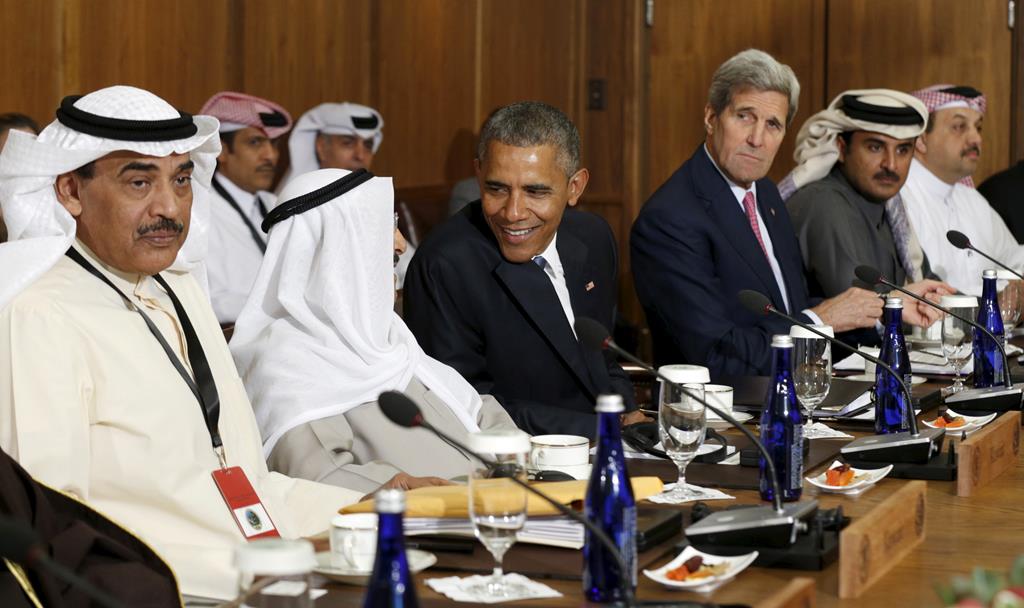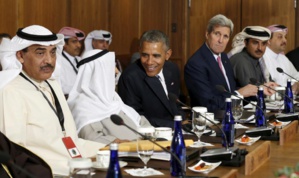Arab nations are a major procurers for sophisticated U.S arms, which have always followed two distinct rules: the first being that no weapons will be ever sold to them which is likely to give them a qualitative military edge over Israel and the second, only those weapons that are an integral part of the U.S arsenal will be up for sale to them.
Judging against, this week’s, backdrop of a White House summit wherein Arab Leaders met president Obama’s Administration at Camp David, it has come to light that rule number two has been dispensed with. As per the Mr. Colin Kahl, the NSA to U.S VP Joe Bidden, the UAE’s pilots fly more advanced versions of the F-16 fighter jets than their U.S equivalent. “They’re more advanced than the ones our Air Force flies.” He declined to go into specifics.
As per a briefing, it was revealed that the U.S promised the 6 member Gulf Cooperation Council (GCC), comprising of Qatar, Oman, UAE, Bahrain, Saudi Arabia and Kuwait more weapons, increased military training, as well as a pledge to defend them against cyberattacks, missile strikes and maritime threats from Iran.
An equally important reason for this meeting to happen was the beefing up of the security scenario in light of the growing threat posed by the terrorist group which calls itself the Islamic State of Iraq and Syria (ISIS).
At a news conference, following the summit, President Obama said, “I am reaffirming our ironclad commitment to the security of our Gulf partners.”
During the summit, it appears that the GCC members had wanted to sign a mutual defence treaty with the United States, on similar lines it has with South Korea and Japan. The U.S however, was reluctant to enter into an agreement and did not sign such a treaty. Despite the lack of any formal agreement, the U.S still considers Israel, Egypt, Kuwait, Jordan and Pakistan, as major Non-NATO allies. In light of this, Kahl has reassured them saying “This administration has worked extraordinarily closely with the Gulf states to make sure they had access to state-of-the-art armaments.”
However, the U.S has, so far, not entertained any requests from them for the sale of its most advance fighter planes – the F35, however, Mr. Kahl went on to explain that “…keep in mind under this administration we moved forward on a package for the Saudis that will provide them the most advanced F-15 aircraft in the region.”
Doling out statistics on arms spending so as to allay their fears, Kahl mentioned that the GCC as a whole spent nearly $135 billion, with Saudi Arabia spending $80billion on its own defence budget. In comparison, Iran has spent only around 15 billion.
It is to be noted that the GCC doesn’t procure its arms and ammunition from the U.S alone, Britain and France feverishly compete with the U.S for a share of the rising arms market in the middle-east and the continuing turmoil in Yemen, Syria and Libya only add fuel to the fire.
“None of the GCC countries has been mainly dependent on a single arms supplier in the past four to five decades. The U.S., UK and France have long been the main suppliers to the GCC, competing against each other,” said Pieter Wezeman, a senior researcher at Arms and Military Expenditure Programme at the Stockholm International Peace Research Institute (SIPRI).
References:
Judging against, this week’s, backdrop of a White House summit wherein Arab Leaders met president Obama’s Administration at Camp David, it has come to light that rule number two has been dispensed with. As per the Mr. Colin Kahl, the NSA to U.S VP Joe Bidden, the UAE’s pilots fly more advanced versions of the F-16 fighter jets than their U.S equivalent. “They’re more advanced than the ones our Air Force flies.” He declined to go into specifics.
As per a briefing, it was revealed that the U.S promised the 6 member Gulf Cooperation Council (GCC), comprising of Qatar, Oman, UAE, Bahrain, Saudi Arabia and Kuwait more weapons, increased military training, as well as a pledge to defend them against cyberattacks, missile strikes and maritime threats from Iran.
An equally important reason for this meeting to happen was the beefing up of the security scenario in light of the growing threat posed by the terrorist group which calls itself the Islamic State of Iraq and Syria (ISIS).
At a news conference, following the summit, President Obama said, “I am reaffirming our ironclad commitment to the security of our Gulf partners.”
During the summit, it appears that the GCC members had wanted to sign a mutual defence treaty with the United States, on similar lines it has with South Korea and Japan. The U.S however, was reluctant to enter into an agreement and did not sign such a treaty. Despite the lack of any formal agreement, the U.S still considers Israel, Egypt, Kuwait, Jordan and Pakistan, as major Non-NATO allies. In light of this, Kahl has reassured them saying “This administration has worked extraordinarily closely with the Gulf states to make sure they had access to state-of-the-art armaments.”
However, the U.S has, so far, not entertained any requests from them for the sale of its most advance fighter planes – the F35, however, Mr. Kahl went on to explain that “…keep in mind under this administration we moved forward on a package for the Saudis that will provide them the most advanced F-15 aircraft in the region.”
Doling out statistics on arms spending so as to allay their fears, Kahl mentioned that the GCC as a whole spent nearly $135 billion, with Saudi Arabia spending $80billion on its own defence budget. In comparison, Iran has spent only around 15 billion.
It is to be noted that the GCC doesn’t procure its arms and ammunition from the U.S alone, Britain and France feverishly compete with the U.S for a share of the rising arms market in the middle-east and the continuing turmoil in Yemen, Syria and Libya only add fuel to the fire.
“None of the GCC countries has been mainly dependent on a single arms supplier in the past four to five decades. The U.S., UK and France have long been the main suppliers to the GCC, competing against each other,” said Pieter Wezeman, a senior researcher at Arms and Military Expenditure Programme at the Stockholm International Peace Research Institute (SIPRI).
References:


 The U.S Administration holds an arms fest at Camp David for the GCC
The U.S Administration holds an arms fest at Camp David for the GCC





 Companies
Companies